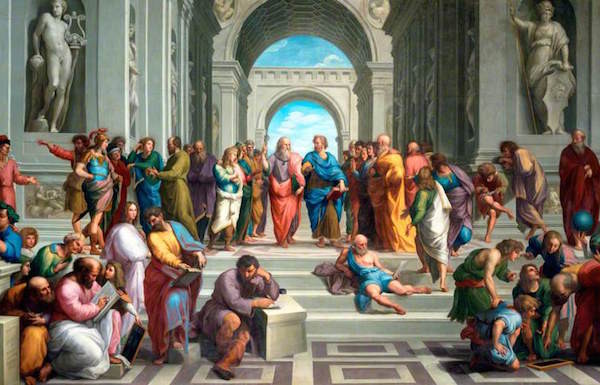A Bad Case Against Classical Theism
by Thomas M. Cothran
Filed under The Existence of God
NOTE: This is the second of a three part series on classical theism by theologian Thomas M. Cothran. Read part one here.
Stephen Webb not only misstates what classical theists believe, he misstates why they believe it. Consider, by way of example, Webb’s review of David Bentley Hart’s The Experience of God. Webb claims that Hart infers “the main tenets of classical theism … from the deceptively simple premise of God’s immateriality.” Webb attributes a similar line of reasoning—namely that “being immaterial, God is not limited in any way”—to classical theists in his book Mormon Metaphysics.1 But classical theists, including Hart, can (and for the most part do) believe in all manner of immaterial things—angels, concepts—without ascribing to them divinity or infinity. Classical theists, including those Webb cites as representative, simply do not argue that immateriality entails divinity or infinity.2
Webb’s review proceeds to claim that Hart “does not mean that God is literally infinite.” This is quite an odd statement, since an insistence on God’s infinity has been a core theme of Hart’s work for well over a decade. Hart, in fact, clearly and repeatedly insists on a positive notion of divine infinity not only in the Experience of God,3 but also his more substantial Beauty of the Infinite and sundry essays such as “The ‘Christian Infinite.’”4
These sorts of misreadings are not limited to contemporary authors. Webb attributes to Plato (among others) the notion that God is “pure being” when famously, for Plato, being is subsequent to the one in the metaphysical order. Webb claims that “Christians worshiped Jesus for several centuries before any of them thought to argue that God created the world out of nothing ….”5 In fact, the Old Testament narrative probably presupposes creation ex nihilo6, and the doctrine is rather baldly stated in 2 Maccabees 7:28. The doctrine can be found quite early among Christian sources such as The Shepherd of Hermas and Irenaeus’ Against Heresies circa 180 AD.
The result of all of this is that it is quite difficult to find anything salvageable in Webb’s critique of classical theism, since he accurately presents neither what classical theists believe nor the arguments they actually give for their beliefs. Atheist polemicists unfortunate enough to adopt Webb’s account of classical theism would resemble a ragtag legion lost on the wrong continent, without enough of an idea what the foe looks like to identify him in the unlikely event that they someday meet. Webb sometimes abandons even the semblance of rational argument and stoops to accusing classical theists of bad faith, as when he says “for me, [Hart’s] mantra that ‘God is outside of space and time’ is most certainly false, and I think he knows that too.” If there is one thing popular anti-atheists do not need to learn from theologians, it how to make nasty personal attacks.
Why Is God Immaterial?
If classical theists don’t affirm God’s transcendence in bad faith or because they think God is imaginary, what reasons do they have for so overwhelmingly conceiving of God as immaterial? The Christian answer comes quickly enough from Scripture. The Gospel of John stoutly declares that ”God is a spirit,” and, as Jesus himself says, spiritual things “lack flesh and bone.” The Hebrew scriptures define idolatry as the confusion of God with any particular reality on earth, below the earth or in the heavens, the Wisdom literature praises God’s transcendence, and the New Testament indicates the abyss of God’s transcendence through Jesus Christ’s very imminence.
It is unclear whether Webb intends to indict the author of John’s Gospel with those “elite theologians” embarrassed by Christian doctrine. Yet the theological reason that Christians do not believe God to be material does not hinge on this or that text considered in isolation, but on the basic notion of God that emerges from the Scriptures: as the Creator of the universe, the ultimate source and origin of all that has being.
Webb, on the other hand, proposes a material god, a god with a body.7 Such a deity cannot be the creator of the Hebrew and Christian Scriptures, for reasons Philip Cary cites in his review of one of Webb’s books. All material beings depend for their existence on something more fundamental—that out of which they are made. Yet any god who is dependent for his existence on something else is only a proximate, and not an ultimate, source of being.
Take the classic example of a statue. A statue can be made out of bronze while sharing the same form, say, of Richard the Lionheart. The material is not really identical to the form—since the same material can be reshaped to become a pillar or a number of coins—but it is necessary to the statue’s existence. The statue depends on the material out of which it is made, and we rightly speak of the bronze as a cause of the statue. Material entities have material causes.
If God were a material being, then, he would be caused and dependent. God would not be the ultimate origin of all that is; he would himself depend on something more basic. No Christian could affirm this, of course, because it puts God on the side of the caused and the contingent. It is, therefore, straightforwardly the case that asserting the materiality of God is inconsistent with the Christian doctrine of creation.
The Intrinsic Connection Between Classical Theism and Christian Doctrine
Webb also thinks the doctrines of divine immateriality and the Incarnation are ill suited for one another. For example, in “Plato is not Paul” he says “I don’t believe that God is outside space and time for the simple reason that I believe Jesus Christ is in heaven, fully bodied, and ruling over the world.” And indeed, readers unfamiliar with the Christian doctrine of the Incarnation might find themselves confused: if Jesus is God and Jesus is a material being, why shouldn’t way say that God is a material being?
Yet for the Christian, this objection runs immediately into problems: if we attribute materiality to God, why not attribute ethnicity to God. Does it belong to God to be semitic? The way that Christians have thought about this answer traditionally has been to say that Jesus had two natures: human and divine, and that those two natures are unmixed. Indeed, the denial of this point places one outside Christian orthodoxy.8 Not everything true of Jesus with respect to his humanity can be affirmed straightforwardly of his divinity.
Christians, then, can attribute material being to God in much the same sense as they can attribute to him an ethnicity or being the son of Mary. But this does not commit us to say that God qua God is a material being. The eternal can become united, in history, to the temporal. While perhaps paradoxical, it is obviously not contradictory.
Indeed, it is the notion of a material deity which cannot be reconciled to the doctrine of the Incarnation. Webb’s materialism would mean that the Incarnation would no longer be the singular event in which the infinite and eternal takes up the finite and temporal. It would be simply the reincarnation of a certain extra-terrestrial. Christians, after all, believe in the eternal Logos who took on flesh, not in bad late night science fiction.
The classical theistic notion of God is not only necessary to maintain Christological doctrine; it is requisite for Trinitarian dogma. Webb makes several strange claims on this point. He claims, for instance, that classical theists consider “Jesus Christ identical with God the Father”9, when, in fact, any orthodox Christian denies this. Webb veers to the other extreme when he says that “[n]o classical theist has ever given a convincing account of how God can be without parts and yet composed of three persons.”10 But of course, no orthodox Christian thinks that the divine persons are “parts” of God.
Webb frequently misstates what divine simplicity is understood to be. For example, Webb claims that simplicity and immateriality are equivalent: “divine simplicity can be stated in many ways, but it basically means that God has no parts. Or you could just say that God is immaterial (since anything material can be divided).” Webb’s assumption that simplicity just is the same as immateriality rather obvious errs, of course, in that there are immaterial things that are not simple—such as angels or concepts. Moreover, as William Vallicella has pointed out, Webb’s summary of simplicity is deficient: divine simplicity excludes not only parts, but metaphysical composition between act and potency, thus ruling out any real composition of essence and existence, substance and accident, matter and form, and so on.11
Far from being at odds with the Trinity, the doctrine of simplicity is a necessary component to any sound Trinitarian dogma. There is one God. Yet simplicity, while excluding composition and extension, does not exclude all real relations. Were the persons “parts” of God or distinct accidents that belong to God, the triunity of God would contravene simplicity. However, the persons are subsistent relations. None of the arguments used to establish God’s simplicity would exclude subsistent relations; and, indeed, when the notions of simplicity and subsistent relations are combined we are given a perfectly consistent (though obviously not comprehensive) way of affirming the unity and triunity of God.
If Webb’s theological arguments run afoul both of the historical record and logical coherence, what of his philosophical argument? Is Webb right that classical theism asserts God’s immateriality because it misunderstands the nature of matter?
Webb’s exposition of how the Western philosophical tradition understands matter is, unfortunately, unreliable at best. In the first place, Webb misunderstands what classical theists typically mean by “matter.” For example, he attributes to classical theists the view that matter is “a substance that makes up everything we know, [and] is unknowable.”12 Yet perhaps the most elementary point about the classical Western understanding of matter and substance is that matter is not a substance.
Webb goes on to claim that the traditional notion that matter is a limiting factor is true “if matter is the inert stuff that is destined to disappear when our souls enter into the afterlife. But what would happen to these assumptions if we thought that matter is more like the fields of energy that animate the whole cosmos rather than incredibly small particles held together by external forces?”13 But precious few classical theists think of matter as “incredibly small particles held together by external forces.”14 Webb’s assertion that classical theists talk about “bare matter in its most elementary form,”15 wildly conflates the most basic metaphysical categories of theists like Plato, Aristotle, Origin, Aquinas (etc.) are.
But then, classical theism as such entails no particular position on the relation of matter and form (other than their distinction). Indeed, though none of the classical Western traditions actually resemble Webb’s portrait, classical theists do not hold to a single doctrine of what matter is. Being a classical theist does not commit one to any particular Greek, Latin, German, of Indian view of material being. Webb’s attempts at refutation are directed only at his Frankensteinian creation, and do not come near any particular living species of theism.
NOTE: Stay tuned for part three of this series on Friday.
Related Posts
Notes:
- Mormon Metaphysics, 29. It is true, of course, that God’s immateriality is an important part of understanding God’s transcendence and can, in combination with other premises be part of an argument establishing other tenets of classical theism. But it is not the case that Hart or other classical theists (with the possible exception of universal hylomorphists) argued that “God is immaterial” entails God’s infinity or divinity. For this enthymatic argument would obviously require the major premise to be thatallimmaterial beings have the characteristics of God, which is generally rejected (again, with the exception of universal hylomorphists). ↩
- A more expansive explanation of Webb’s error has been made by William Vallicella: http://maverickphilosopher.typepad.com/maverick_philosopher/2014/01/a-misunderstanding-of-divine-simplicity.html ↩
- See e.g., The Experience of God: Being, Consciousness, Bliss, 7, 30, 31, 33, 36, 39, 42, to cite only a fraction of the places Hart attributes infinity to God. ↩
- David Bentley Hart, “The ‘Christian Infinite’” in Infinity: New Research Frontiers,eds. Michael Heller & W. Hugh Voodin, pp. 255-276 (esp. 283 ff). ↩
- Emphasis added. ↩
- See Walther Eichrodt, “In the Beginning,” in Israel’s Prophetic Heritage: Essays in Honor of James Muilenburg, (1962). There is, of course, some controversy on this point. ↩
- See e.g., chapter 10 of Jesus Christ, Eternal God. ↩
- For a discussion of the Council of Chalcedon, see http://www.newadvent.org/cathen/03555a.htm ↩
- Mormon Christianity, 168 ↩
- "Plato is not Paul". ↩
- William Vallecella, “A Misunderstanding of Divine Simplicity.” (http://maverickphilosopher.typepad.com/maverick_philosopher/2014/01/a-misunderstanding-of-divine-simplicity.html ↩
- Mormon Metaphysics (emphasis added). ↩
- Mormon Metaphysics, 8. ↩
- Mormon Metaphysics, 8. ↩
- Mormon Metaphysics, 81 (emphasis added). ↩
Note: Our goal is to cultivate serious and respectful dialogue. While it's OK to disagree—even encouraged!—any snarky, offensive, or off-topic comments will be deleted. Before commenting please read the Commenting Rules and Tips. If you're having trouble commenting, read the Commenting Instructions.













